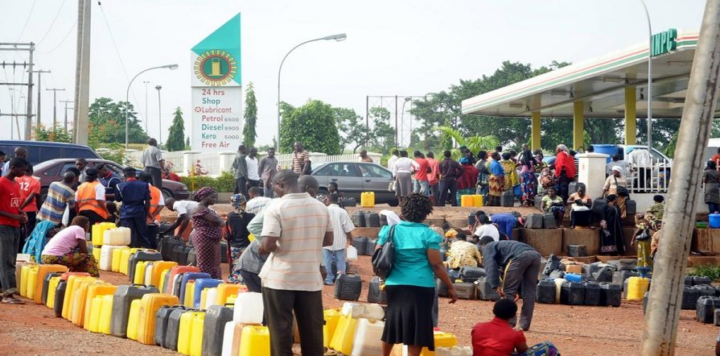Long queues have resurfaced at filling stations across major Nigerian cities as tensions between the Petroleum and Natural Gas Senior Staff Association of Nigeria (PENGASSAN) and Dangote Refinery intensify, fueling concerns about another round of nationwide scarcity. Motorists in Lagos, Abuja, and several state capitals spent hours at petrol stations over the weekend, while some outlets were forced to shut down entirely due to limited supply. The development has reignited anxiety over fuel stability barely months after Nigerians were promised improved domestic refining capacity.
The crisis stems from an ongoing face-off between Dangote Refinery management and PENGASSAN, which represents senior oil and gas workers. The union has accused the refinery of unfair labor practices, inadequate welfare for staff, and refusal to fully integrate workers into industry-standard agreements. According to PENGASSAN officials, several attempts at negotiation with the refinery have failed, leading to heightened agitation among workers. The union has threatened to escalate the standoff if their demands are ignored, a move that could cripple fuel supply chains.

Dangote Refinery, on its part, has dismissed the claims, insisting it is operating within legal frameworks and adhering to labor standards. Company representatives argue that the union’s demands are politically motivated and intended to disrupt the refinery’s operations at a critical stage of scaling up production. The refinery, which recently began limited supply to the local market, says it remains committed to ensuring affordable and steady fuel availability across Nigeria.
The timing of the conflict is particularly troubling for consumers, as the Dangote Refinery had been touted as a game-changer for Nigeria’s petroleum sector. With a nameplate capacity of 650,000 barrels per day, the facility is the largest in Africa and was expected to drastically reduce dependence on imported refined products. Many Nigerians had hoped that the refinery’s entry into the market would stabilize supply and lower pump prices, but the unfolding dispute now casts doubt on those expectations.
Reports from filling stations indicate that marketers are already adjusting pump prices upwards in response to reduced supply, with petrol selling above government-approved rates in some areas. Independent marketers warn that unless the dispute is swiftly resolved, the scarcity could worsen in the coming weeks. They stress that any disruption in Dangote’s distribution network has immediate consequences for the entire downstream sector, given the refinery’s growing influence on supply.
The Federal Government has intervened, calling for calm and urging both parties to return to the negotiating table. The Ministry of Labour and Employment has reportedly opened talks with PENGASSAN leadership and Dangote Group officials to prevent a nationwide strike. Officials from the Nigerian National Petroleum Company Limited (NNPC) have also expressed concern, noting that the standoff could undermine ongoing efforts to ensure energy security and stabilize the economy.
PENGASSAN, however, has maintained a firm stance, warning that unless its grievances are addressed, workers may withdraw their services, further choking supply chains. The union’s president emphasized that the welfare of members cannot be compromised and that the refinery must comply with global best practices if it is to operate sustainably. This position has resonated with other labor groups, some of which have pledged solidarity, raising fears of broader industrial unrest in the oil and gas sector.
For motorists, the impact is already being felt. In Lagos, queues stretched for several kilometers in parts of Ikeja, Surulere, and Ikorodu, while Abuja residents reported waiting for up to five hours to purchase petrol. Transport fares have spiked as commercial drivers grapple with limited fuel availability, leaving commuters stranded in many parts of the country. The situation has also triggered panic buying, with many Nigerians rushing to stockpile petrol, further straining already scarce supplies.
Analysts say the dispute highlights deeper issues in Nigeria’s petroleum sector, particularly the challenges of labor relations, regulation, and transparency in a market that is undergoing significant change. They argue that unless labor disputes are managed effectively, the benefits of domestic refining may not fully materialize, leaving the country stuck in cycles of scarcity and price hikes. Some experts have urged the government to mediate decisively, warning that prolonged disruptions at the Dangote Refinery could derail broader economic recovery efforts.
Meanwhile, the uncertainty has rekindled debate about the deregulated fuel market and Nigeria’s heavy reliance on a single mega-refinery. Critics argue that the government must create an enabling environment for more private refineries to thrive, reducing the risks of supply shocks caused by disputes involving one major player. Others stress the importance of strengthening regulatory frameworks to balance the interests of workers, investors, and consumers.
As the standoff deepens, Nigerians are left grappling with familiar frustrations—long queues, rising prices, and uncertainty over fuel supply. The coming days will be crucial, as negotiations between PENGASSAN and Dangote management could determine whether the situation stabilizes or spirals into a full-blown crisis. For now, the return of fuel queues serves as a stark reminder of the volatility that continues to define the country’s downstream petroleum sector.
Support InfoStride News' Credible Journalism: Only credible journalism can guarantee a fair, accountable and transparent society, including democracy and government. It involves a lot of efforts and money. We need your support. Click here to Donate
